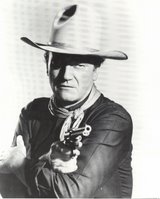Mitch Lewis wrote:
Resistance to raising my hands in the air and singing emotional love songs to God doesn't have anything to do with humbling myself before God; it has to do with resistance to turning my life over to folks who think their style of worship is more spiritual than mine.
I never feel more humbled and dependent before God - sometimes to the point of tears - than when singing "A Mighty Fortress." Luther's words hardly encourage spiritual pride.
Some people are more emotion-focused, and some are more thought-focused. That is not a sin to be overcome, but simply a description of our varied natures. If I'm a "thinking" person at heart, it might be good for me to develop some flexibility by exercising my "feeling" side a bit (and the converse if I'm a "feeling" person), but that's a simply a matter of personal maturity, not a matter of Christian essentials. (And to call it a matter of gender misses the point. It's personality type, not gender, that is significant.)
I'm more left brained, too (or so people tell me). Being a Christian means a certain amount of intellectual content. But it also has an emotional component in its full expression, as John Wesley wrote:
 The nature of religion is so far from consisting in these, in forms of worship, or rites and ceremonies, that it does not properly consist in any outward actions, of what kind so ever. It is true, a man cannot have any religion who is guilty of vicious, immoral actions; or who does to others what he would not they should do to him, if he were in the same circumstance. And it is also true, that he can have no real religion who "knows to do good, and doth it not." Yet may a man both abstain from outward evil, and do good, and still have no religion. Yea, two persons may do the same outward work; suppose, feeding the hungry, or clothing the naked; and, in the meantime, one of these may be truly religious, and the other have no religion at all: For the one may act from the love of God, and the other from the love of praise. So manifest it is, that although true religion naturally leads to every good word and work, yet the real nature thereof lies deeper still, even in "the hidden man of the heart."
The nature of religion is so far from consisting in these, in forms of worship, or rites and ceremonies, that it does not properly consist in any outward actions, of what kind so ever. It is true, a man cannot have any religion who is guilty of vicious, immoral actions; or who does to others what he would not they should do to him, if he were in the same circumstance. And it is also true, that he can have no real religion who "knows to do good, and doth it not." Yet may a man both abstain from outward evil, and do good, and still have no religion. Yea, two persons may do the same outward work; suppose, feeding the hungry, or clothing the naked; and, in the meantime, one of these may be truly religious, and the other have no religion at all: For the one may act from the love of God, and the other from the love of praise. So manifest it is, that although true religion naturally leads to every good word and work, yet the real nature thereof lies deeper still, even in "the hidden man of the heart."I say of the heart. For neither does religion consist in Orthodoxy, or right opinions; which, although they are not properly outward things, are not in the heart, but the understanding. A man may be orthodox in every point; he may not only espouse right opinions, but zealously defend them against all opposers; he may think justly concerning the incarnation of our Lord, concerning the ever-blessed Trinity, and every other doctrine contained in the oracles of God; he may assent to all the three creeds, -- that called the Apostles', the Nicene, and the Athanasian; and yet it is possible he may have no religion at all, no more than a Jew, Turk, or pagan. He may be almost as orthodox -- as the devil, (though, indeed, not altogether; for every man errs in something; whereas we can't well conceive him to hold any erroneous opinion,) and may, all the while be as great a stranger as he to the religion of the heart.
Emphasis added. Worship, regardless of the form, should produce a feeling of utter dependence on God. Because we are utterly dependent on him. Anyway, I didn't say that we shouldn' t sing traditional hymns like A Mighty Fortress is Our God -- quite the contrary. In fact, I didn't say that contemporary worship is superior to traditional worship, nor did anyone in this thread that is critical of Murrow's article.
Dale Tedder wrote:
 Well, I'm not sure I got that from the article. What I got was that, according to him, men are tired of going to Alan Alda Community Church where, to be "religious," they have to give up any traces of masculinity of the John Wayne variety.
Well, I'm not sure I got that from the article. What I got was that, according to him, men are tired of going to Alan Alda Community Church where, to be "religious," they have to give up any traces of masculinity of the John Wayne variety.Surely there must be some place in the middle.
And frankly, my experience with contemporary Christian "praise and worship music" doesn't speak to any of the things you listed. Would that that genre would say anything about mystery and holiness without just saying 46 times, "you are holy."
Like John Meunier, I don't think that I've ever been to a worship service that is emasculating. If such a thing exists, it should be stopped. Either way, John Wayne-style masculinity is a mixed bag. The characters that he played in movies had one quintessential quality: self-reliance. In many contexts, this is appropriate. A few months ago, one of my neighbors got drunk and tried to break into my apartment in the middle of the night. My wife, dog, and rabbits were depending on me to protect them from physical harm. I got all John Wayne on him, to my wife's delight/horror.
But when I am in church worshipping God, I'm thinking about my relationship with God. Here, self-reliance has zero place. I am totally depraved and cannot resist sin without his grace. I am dead in my sin and cannot live but for his salvation. I'm not self-reliant in these domains; I'm totally helpless.
Stephen Fife wrote:
To defend Murrow (and hope I don't get stoned), I believe that he his trying to study the anthropology of the male species in general when it comes to worship. He is not studying submission to God or what that involves. He is only studying how men respond to worship styles. To be fair he admits that there are a few men who are willing to take on this style of worship, but I challenge you to find men willing to engage in liturgical dance. (What Murrow would term a feminine style of worship)
I should have defined my terms more carefully. When I used the term "anthropology" in my post, I didn't mean the modern social science of human behavior. I mean how we, theologically, understand humanity. My anthropology starts with Total Depravity, which is why I think that fully expressive worship induces an emotive (as well as intellectual) sense of humility before God.
Are we really in disagreement about this? I doubt it. That's why I think that Murrow's argument is just a proxy battle in the eternal bickering between advocates of traditional vs. contemporary worship. Let me echo what Dan Trabue says here:
 Why can't they just say, "I don't like these particular songs. I do like THESE particular songs..."? instead of suggesting it has something to do with manliness if we don't sing songs that sound like war chants?
Why can't they just say, "I don't like these particular songs. I do like THESE particular songs..."? instead of suggesting it has something to do with manliness if we don't sing songs that sound like war chants?I'd suggest it most likely has to do with personal preference, not "manliness," or some macho-flavored version of what it means to be a man.
Exactly. This is about personal preferences, not masculinity and femininity.
Here are other opinions from Oloryn and Henry Neufeld.

5 comments:
People may be replying to arguments that have not been made. There is a perception that if men aren't going to the Episcopal Chrurch, liberals will say something is wrong with men; if women aren't going to the Baptist Chrurch, liberals will say there is something wrong with the Baptist Curch. Add words like 'some' and 'disproportionatly' as needed.
Surely there must be some place in the middle.
Or better, places for the various 'flavors' of masculinity to all be able to be themselves within the church. G. K. Chesterton makes an argument in Orthodoxy that balance at times consists not of finding a middle place between two extremes (which produces a mixture of the two), but of finding a way that the extremes can co-exist and be themselves. This may apply here.
John Wayne-style masculinity is a mixed bag. The characters that he played in movies had one quintessential quality: self-reliance.
Is that because the tough-man aspect has to be self-reliant, or is it because
the fall has twisted it that way? And if the latter, can we discern a valid 'untwisted' tough-man character which represents a valid need? Ministry to men of this bent may have to be two-fold: meeting the valid underlying need, while teaching on doing away with the twist.
Wow, seems to be a lot of interest in this question. My point about traditional hymns was simply meant to respond to those who think I cannot possibly have a whole-person experience of God's grace in forms they consider boring or cold. Not that I was suggesting you thought otherwise, but I have encountered many folks who do have a judgmental attitude toward forms of worship that I find very powerful (and not just because they think old forms don't reach the new generation.)
Just a couple more thoughts.
I say of the heart. For neither does religion consist in Orthodoxy, or right opinions; which, although they are not properly outward things, are not in the heart, but the understanding.
Truly, one is not saved by right opinions but by the gracious power of God. But grace gives us no more reason to be careless about our thinking than about any other aspect of our lives. (Just an observation; not that I'm suggesting you think otherwise.)
And the whole question of the heart leads us to the question of Biblical anthropology. Now there's a can of worms.
Regards ...
This has been a fascinating conversation, and one with a lot of energy around it for a lot of people it appears.
I think David is an interesting role model for men here. This is a guy who was tough and brave as they come, but he also was foolish and - from reading the Psalms - even weepy at times.
And, of course, there is Jesus who had more physical courage than I can imagine and more tenderness.
My only additional comment at this point is that I am glad to see John stood up for the honor of his rabbits when they were depending on him.
This is about personal preferences, not masculinity and femininity
AMEN!
Now on the question of Alt worship...?
Post a Comment